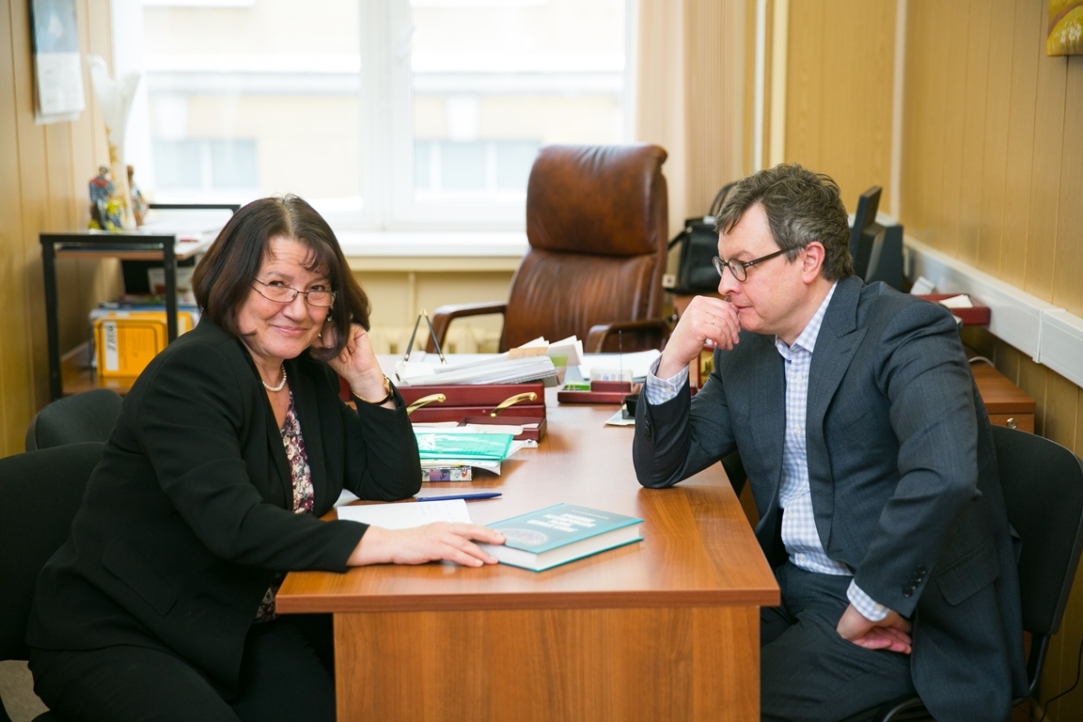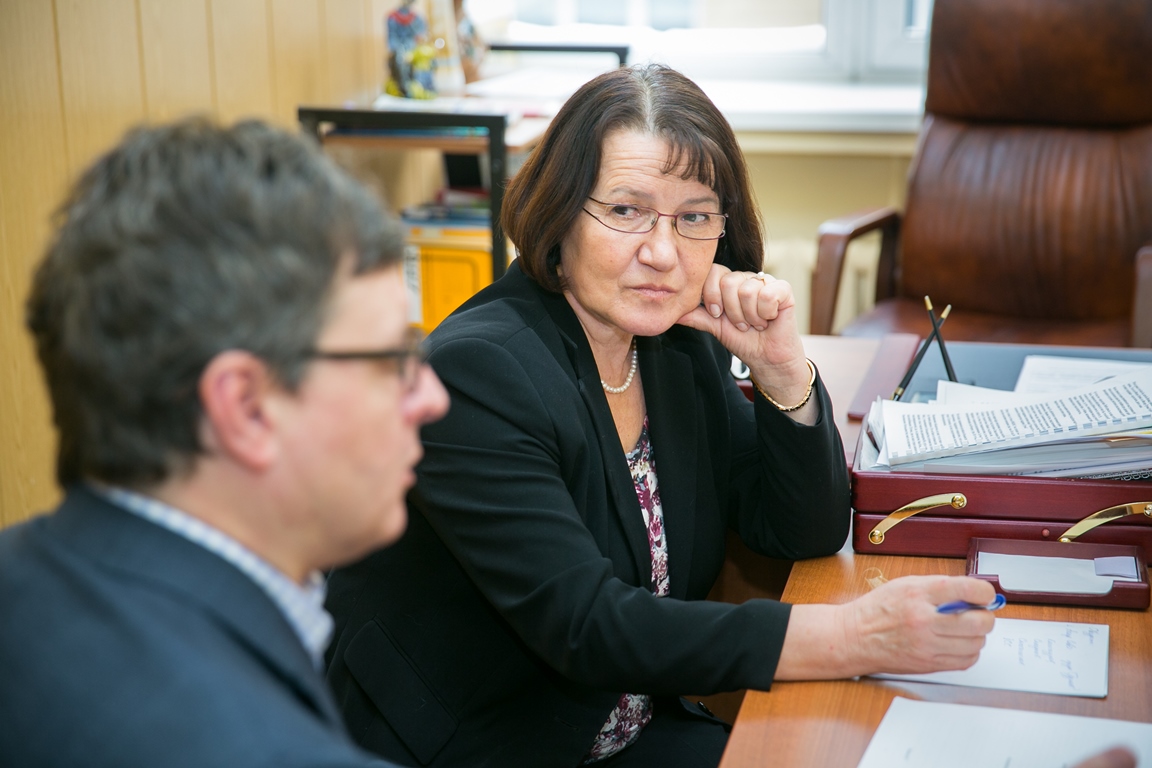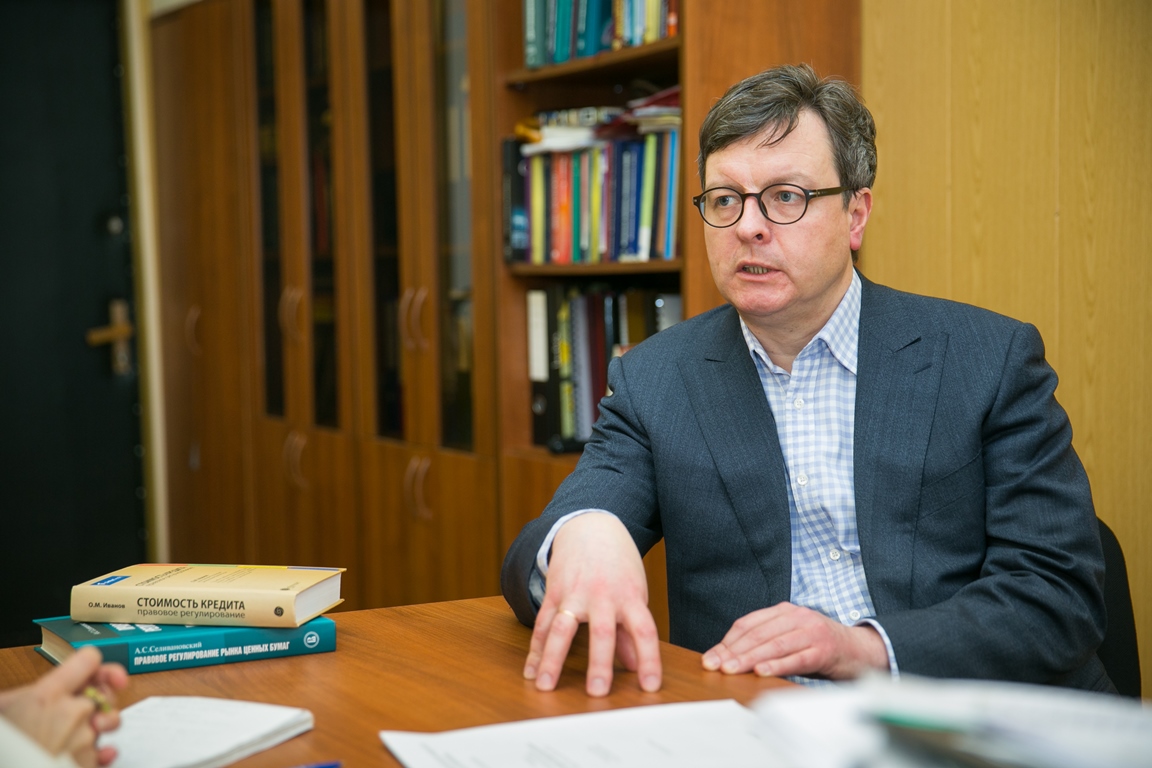HSE Trains Lawyers to Understand Modern Financial Markets

In 2018, a new Master's programme, ‘Lawyer on the Global Financial Market’, will be launched at the Higher School of Economics. The programme’s Academic Supervisor, Anton Selivanovskiy, and the Chairman of the Academic Council, Oxana Oleynik, explained how it came about and what it will offer students.
A New Type of Lawyer
Despite the predictions that lawyers will one day be replaced by robots, the need for highly qualified specialists has continued to increase in recent years. Our programme trains lawyers who are risk-oriented. They are specialists who are able to anticipate emerging risks on financial markets and to identify the legal means to minimize them. Risk-oriented management is being introduced in financial markets, and therefore, the role of a lawyer should be adjusted accordingly. Lawyers have to take into account both existing legal risks related to judicial practice and changing legislation, as well as financial and economic risks.
The Master's programme ‘Lawyer on the Global Financial Market’ trains lawyers to work in financial markets and with financial organizations. Graduates of our programme will be highly sought-after by Russian and international financial organizations (banks, investment companies, investment funds, leasing companies), by non-financial organizations that are clients of financial organizations and need qualified lawyers to negotiate and optimize legal relations, by legal and consulting firms, and by legal services of public authorities.
The programme is administered by the Higher School of Jurisprudence at HSE in partnership with the National Association of Stock Market Participants (Russian: НАУФОР), Thomson Reuters and the Moscow Stock Exchange. The partners will take part in conducting classes, master classes and seminars, and will also offer internships to top students.

Competitive Advantages of the Programme
Innovation
The financial market is responsible for a huge number of new entities, mechanisms and institutions, for example, cryptocurrencies, blockchain, crowdfunding and auto-investigation, which can be understood only by a highly qualified specialist. Our Master's programme is the first in Russia to train lawyers in the world financial market. We aspire to educate modern lawyers who understand financial markets and financial institutions from a legal point of view, and who also possess a broad professional outlook.
Study of Related Disciplines
Lawyers in this field should possess not only the necessary competencies in the field of law, but also understand the financial and economic components of the market, and have the managerial skills necessary to head a legal department. A combination of these three components guarantees a lawyer’s success on the international financial market. Hence our Master's programme consists of three blocks, namely the legal, financial, and economic and management disciplines. This, in turn, opens up career opportunities for programme graduates in managerial positions, departments dealing with business deals, and compliance services.
We will discuss the introduction of ‘electronic justice’, whereby a series of standard disputes is considered not only without the participation of the parties involved, but also without a ‘real’ judge
Cutting-edge Expertise
The modern world is changing, and these changes significantly affect law enforcement. Therefore, in our Master's programme, we have included an additional unit related to FinTech (innovation on the financial market) and LegalTech (innovative technologies in the field of law). Students will learn to work with large volumes of information and extract the information needed to solve a specific problem. They will also learn how to organize their work using new technologies. For example, we will discuss the introduction of ‘electronic justice’, whereby a series of standard disputes is considered not only without the participation of the parties involved, but also without a ‘real’ judge. Considering the fact that, in Russia, a significant number of legal disputes (approximately 20%) are connected to the financial market (mainly loans), this area is of great importance and requires careful consideration.
International Experience
It is important to understand that the financial market is not national, but international. In creating our programme, we analyzed similar programmes offered abroad and have adopted the best features of each. According to established practice, such programmmes are referred to as LL.M. Programmes for Banking / Finance / Securities Law. The core of these programmes (and ours will be no exception) consists of disciplines related to banking law and regulation of the stock market. A number of disciplines possess a very strong international focus, such as ‘English Banking and Finance Law’, ‘International Standards for Compliance on Financial Markets’, ‘Issuance of Covered Bonds in Europe, the USA and Russia’, ‘Transboundary Bankruptcy of Companies and Business Restructuring’ and ‘Trusts and Their Use in International Commercial Transactions’.
Inter-industry Integrated Approach
Our education system, which in many respects continues to function according to the extremely outdated Soviet model, trains lawyers to work in specific legal branches (civil law, tax law, criminal law, and so on). In real life, such an approach does not work. It is extremely important for lawyers who work on the financial market to know the law and to understand financial transactions and economic development and to be ready to deal with the many new technologies on both the financial market and in the legal profession. Therefore, our programme includes all the main areas which modern lawyers encounter: taxation of financial transactions, prosecution, the economics of financial and non-financial organizations and modern technologies on the financial market. We strive to train specialists with a broad outlook who understand both how the law functions and how the financial market works.
A Strong Team of Teachers
The courses will be taught by recognized scholars including:
- Nikolay Berzon, tenured Professor at the Higher School of Economics,
- Vladimir Burenin, Head of the Department of International Finance, Academic Supervisor of the Master's programme ‘Stock Market and Derivatives’, Moscow State Institute of International Relations
- Aleksander Vishnevskiy, Professor at the Higher School of Economics (will teach the course of comparative jurisprudence in financial markets).
- Oxana Oleynik, tenured Professor at the Higher School of Economics (head teacher of the course ‘Modern Problems in the Law of Financial Markets").
- Anton Selivanovskiy, Programme Academic Supervisor (will teach two courses: ‘Legal Regulation of the Stock Market’ and ‘Derivatives and Securitization Transactions: Legal Regulation’).
In addition, the programme will involve experts:
- Vice President of Vnesheconombank, Oleg Ivanov will teach the course ‘Legal Support of Crediting’
- Director of the Department for Financial Market Operations at the Bank of Russia, Alexander Kashturov
- Financial Ombudsman, Pavel Medvedev
- Managing Director of the PPP Center at Gazprombank, Elena Bardasheva,
- Director of the Legal Department of the PJSC Moscow Exchange, Alexander Smirnov
- Director, Regional Legal Adviser at Mastercard in Russia, Igor Spiranov,
- Managing Director of Compliance at PJSC Sberbank, Dmitry Kheylo.
The work in the field of FinTech will be told by the leaders of well-known companies providing legal services, including:
- Head of the Legal Services for Technology Projects at Deloitte, Artem Tolkachev,
- Partner of law firm ‘Simpler’, Anton Vashkevich,
- Partner of the law firm ‘Zarcin, Yankovsky & Partners’, Roman Yankovsky,
- Partner of Danilov & Konradi, LLP Lyudmila Merkulova
A number of courses will be taught by international experts in English.
The programme also includes numerous master classes that will be held by bankers, heads of legal services of banks, heads of legal services of corporations and leaders in the field of FinTech and LegalTech.
Many disciplines are optional, including the more traditional courses, such as ‘Taxation of Financial Transactions’ and ‘Legal Regime of Settlements’, as well as highly specialized disciplines such as ‘Issuance of Covered Bonds in Europe, USA and Russia’ (in English) and ‘Derivatives and Securitization Transactions: Legal Regulation’ and ‘International Standards of Compliance on Financial Markets’.
Research Seminars and Projects
The programme also includes two research seminars and three research projects on the most relevant topics, including ‘Legal Regime of Information in Financial Markets’ and ‘Legal Regulation of FinTech: Cryptoshares, Blockchain, New Business Financing Mechanisms’. Over the course of the research work, students will carry out a project set by the teacher, and then present it and justify their methods in a group discussion. We also plan to invite industry experts to the seminar discussions.

Who is the Programme Designed For?
Our Master's programme is intended for three types of students:
- practicing lawyers (a ‘Master's programme for adults’). We understand that at present, lawyers, even experienced ones, need to touch up on their knowledge and skills, and there are very few specialized programmes that offer the opportunity to do so. Our programme is ideally suited to lawyers who have experience in the legal services in financial institutions, or in law firms that are actively involved with financial institutions.
- graduates who are fresh out of law school. For these students, the programme will be a challenging but invaluable opportunity which will set them on the right career path.
- graduates in non-legal areas, such as economists, managers, sociologists, psychologists and IT specialists, who work in financial institutions and want to improve their qualifications in the field of legal support for these organizations.
The expected minimum intake for the first year of study includes 20 paid places for Russian nationals and five places for international students. There is no admission via the Federal Quota Scheme (Russian government scholarships) or Olympiads. Places are awarded on a competitive basis (portfolio). More about the criteria can be found here.
See also:
HSE Team Advances to International Final Round of WTO Competition
Students of the HSE Faculty of Law won the regional round of the John H. Jackson Moot Court Competition, which is organized by the European Law Students Association with the support of the World Trade Organization. The final round will be held in Geneva in June.
HSE Creates Department of Financial Market Infrastructure with the Support of Moscow Exchange
HSE and Moscow Exchange are founding a joint Department of Financial Market Infrastructure at the Faculty of Economic Sciences. It will bring together HSE lecturers and Moscow Exchange staff. Students will be offered new courses and will also have the opportunity to participate in project work and undertake internships at the Exchange.
HSE Signs a Memorandum of Cooperation with Thomson Reuters
The main objectives of the newly-signed agreement include the development of scientific cooperation between Thomson Reuters and HSE, the exchange of experience and information in the field of law and the improvement of the legal education process.
Law Students Should Realise That in the Future a Person’s Life Could Be in Their Hands
The finalists in the Model for an International Criminal Court competition have been announced at HSE. This game in the form of a trial is based on proceedings at the ICC in the Hague. In Russia the first two rounds of the competition are happening for the 4th time, for three years in a row they have been held at the HSE Faculty of Law.
Sociological Theories: a View on the Economy
From October 25th – 28th an international academic conference ‘Embeddedness and beyond: Do sociological theories meet economic realities?’ took place at the HSE. Here are some video interviews with conference participants.


